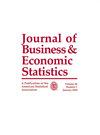论贾科米尼、北川彻、里德的“叙事限制与代理”
IF 2.9
2区 数学
Q1 ECONOMICS
引用次数: 1
摘要
我很感激有机会讨论Giacomini、Kitagawa和Read(因此是GKR)撰写的这篇极具洞察力的论文。自Antolín-Díaz和Rubio Ramírez(2018)的开创性贡献以来,叙事限制已迅速成为SVAR分析中强化因果推断的常用工具之一。Giacomini、Kitagawa和Read(2021)极大地促进了我们对主观先验信念的作用以及在利用此类叙事信息时可能性函数的适当形式的理解。在这篇讨论的新论文中,GKR将他们先前提出的稳健贝叶斯推理程序与另一种原生方法进行了比较,该方法从叙述信息中构建分类代理变量,并使用这些变量通过工具变量(IV)回归来估计冲动反应。GKR认为,当我们只有几个时间段的叙述限制时,代理方法可能会遇到弱IV问题,这在实践中经常发生。雪上加霜的是,在SVAR中使用现有的弱IV鲁棒推理技术无法解决这一问题(Montiel Olea,Stock和Watson 2021)。在下文中,我将提出两点。首先,与Antolín-Díaz和Rubio Ramírez(2018)以及Giacomini、Kita gawa和Read(2021)的可能性方法相比,利用叙事信息的代理方法具有几个吸引人的稳健性特性:代理方法允许叙事信号不完美且非随机到达,此外,经济冲击被允许是不可逆的(也称为非根本性的)。其次,GKR讨论的弱IV问题可以通过使用为小样本设计的程序来克服,例如排列测试。本文章由计算机程序翻译,如有差异,请以英文原文为准。
Discussion of “Narrative Restrictions and Proxies” by Raffaella Giacomini, Toru Kitagawa, and Matthew Read
I am grateful for the chance to discuss this characteristically insightful paper by Giacomini, Kitagawa, and Read (hence-forth GKR). Since the seminal contribution of Antolín-Díaz and Rubio-Ramírez (2018), narrative restrictions have rapidly become one of the go-to tools for sharpening causal inference in SVAR analysis. Giacomini, Kitagawa, and Read (2021) con-tributed greatly to our understanding of the role of subjective prior beliefs and the appropriate form of the likelihood function when exploiting such narrative information. In the new paper that is the topic of this discussion, GKR compare their pre-ferred prior-robust Bayesian inference procedure with an alter-native approach that constructs categorical proxy variables from the narrative information and uses these to estimate impulse responses via instrumental variable (IV) regressions. GKR argue that the proxy approach will likely suffer from weak IV problems when we only have narrative restrictions for a few time periods, as is often the case in practice. To add insult to injury, this cannot be addressed using existing techniques for weak-IV-robust inference in SVARs (Montiel Olea, Stock, and Watson 2021).Inthe following I will make two points. First, the proxy approach to exploiting narrative information has several appeal-ing robustness properties relative to the likelihood approaches of Antolín-Díaz and Rubio-Ramírez (2018) and Giacomini, Kita-gawa, and Read (2021): The proxy approach allows the narrative signals to be imperfect and arrive non-randomly, and further-more, the economic shocks are allowed to be non-invertible (also known as non-fundamental). Second, the weak IV prob-lem that GKR discuss can be overcome by using procedures designed for small samples, such as permutation tests.
求助全文
通过发布文献求助,成功后即可免费获取论文全文。
去求助
来源期刊

Journal of Business & Economic Statistics
数学-统计学与概率论
CiteScore
5.00
自引率
6.70%
发文量
98
审稿时长
>12 weeks
期刊介绍:
The Journal of Business and Economic Statistics (JBES) publishes a range of articles, primarily applied statistical analyses of microeconomic, macroeconomic, forecasting, business, and finance related topics. More general papers in statistics, econometrics, computation, simulation, or graphics are also appropriate if they are immediately applicable to the journal''s general topics of interest. Articles published in JBES contain significant results, high-quality methodological content, excellent exposition, and usually include a substantive empirical application.
 求助内容:
求助内容: 应助结果提醒方式:
应助结果提醒方式:


